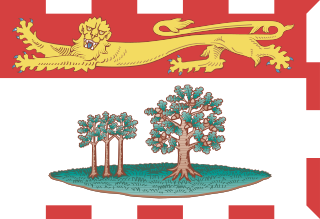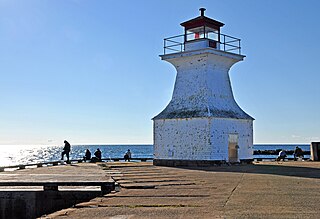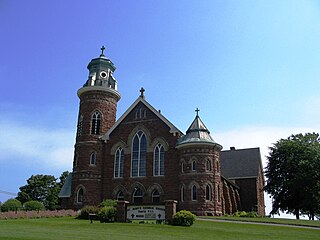Lincoln most commonly refers to:

Prince Edward Island (PEI) is a province of Canada and one of the three Maritime provinces. It is the smallest province of Canada in both land area and population, but the most densely populated. Part of the traditional lands of the Miꞌkmaq, it was colonized by the French in 1604 and later ceded to the British following the conclusion of the Seven Years War in 1763. It was federated into Canada as a province in 1873. Its capital is Charlottetown.
Greenwich is a district of London, England.

British North America comprised the British Empire's colonial territories in North America from 1783 to 1907, not including the Caribbean. The Atlantic island of Bermuda was grouped with the Maritimes from 1783 until the formation of the Canadian dominion, and thereafter generally with the colonies in the British West Indies, although the Church of England continued to place Bermuda under the Bishop of Newfoundland until 1919. The term was first used informally in 1783, but it was uncommon before the Report on the Affairs of British North America (1839), called the Durham Report. These territories today form modern-day Canada and the Pacific Northwest of the United States.
Alma or ALMA may refer to:

Events from the year 1903 in Canada.
"Down East", also "Downeast", is a term for parts of eastern coastal New England and Canada, particularly the U.S. state of Maine and Canada's Maritime Provinces, an area that closely corresponds to the historical French territory of Acadia. The phrase apparently derives from sailing terminology: sailors from western ports sailed downwind toward the east to reach the area.
Saint John's or St. John's may refer to:

Cape Tormentine is a local service district in southeastern New Brunswick, Canada. It is located on the Northumberland Strait at the Abegweit Passage, the shortest crossing between Prince Edward Island and the mainland. It once flourished as a transportation hub between New Brunswick and Prince Edward Island but has been in decline since 1997 when the ferry service was closed due to the opening of the Confederation Bridge. At the Canada 2011 Census the population was 108, three quarters what it was at the 2006 census.
Irishtown or Irish Town may refer to the following places:

Eastern Canada is generally considered to be the region of Canada east of Manitoba, consisting of the following provinces:

▼ }} ▲ }}

The history of post-confederation Canada began on July 1, 1867, when the British North American colonies of Canada, New Brunswick, and Nova Scotia were united to form a single Dominion within the British Empire. Upon Confederation, the United Province of Canada was immediately split into the provinces of Ontario and Quebec. The colonies of Prince Edward Island and British Columbia joined shortly after, and Canada acquired the vast expanse of the continent controlled by the Hudson's Bay Company, which was eventually divided into new territories and provinces. Canada evolved into a fully sovereign state by 1982.
Saint George Parish or Saint George's Parish may refer to:

The New Brunswick and Prince Edward Island Railway, was a company incorporated in 1874 to build a line from the Prince Edward Island ferry terminal at Cape Tormentine, New Brunswick to Sackville where it would connect to the Intercolonial Railway.
This page is based on this
Wikipedia article Text is available under the
CC BY-SA 4.0 license; additional terms may apply.
Images, videos and audio are available under their respective licenses.







